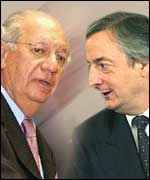
Here in the cone of South America as in many parts of the world, one of the major issues is energy. What with the Andes and all, there are plenty of hydroelectric plants and underground thermal energy but the tricky one is, you guessed it, oil and gas. Sunday the 13th of March, Argentine President Nestor Kirchner visited the centre-left President of Chile; Mr. Lagos. Top of their agenda is energy. In particular, cheap gas supplies from Argentina for Chilean electricity generation.
Chile has become used to a dependable and cheap gas supply from their Argentine neighbor which helps to keep their electricity prices down. Bolivia, Chile’s other gas-rich neighbor refuses to export gas to Chile as a means to bring the Chilean government to the table to negotiate a passage for land-locked Bolivia to the Pacific Ocean. When Bolivia plays football with Chile the Chilean team chants, “Vamos a la playa”, referring to the Bolivia coastline that became part of Northern Chile after the Bolivian defeat in the War of the Pacific just over a hundred years ago. With Argentina strapped for gas and oil, and Bolivia steadfastly refusing to export to Chile, Chile finds itself gas starved and has to import from Argentina. Argentina in turn, of course, imports more and more of its supplies from Bolivia thereby creating a back-door supply route for Chilean gas.
Argentina has become incredibly dependent on a cheap supply of gas. It intends to build another gas pipeline from Bolivia to bring in supplies to its northeastern region when things cool down politically in Bolivia. When Bolivia President Mesa offered his resignation to congress last week, the first President on the phone to offer his country’s support was Mr. Kirchner. Cheap energy in the form of natural gas (CNG by its Spanish initials) is essential to the poorer Argentine driver as about 40% of their cars are converted to work on gas. One cubic meter of gas will allow a driver to drive farther than a liter of gasoline and the price is less than half for the gasoline. But, back to Mr. Kirchner and Mr. Lagos in Chile. Lagos wants Mr. Kirchner to prioritize gas supplies to Chile, a touchy subject right now. Chile has become rather dependent on this supply for cheap electricity supplies locally. Argentina has been supplying less and less gas to Chile prioritizing its own national needs. This has meant that the Chilean government has been forced to purchase diesel on international spot markets to make up the deficit pushing up their costs. Threats of escalating energy costs especially for electricity generation for the mines and cities of Chile are making Lagos unpopular and he needs a favor from his neighbor.
Speaking of favors Mr. Kirchner has made himself very unpopular with international oil concerns (especially Royal Dutch Shell) by advocating a boycott of their products in Argentina. He went on record saying that not a liter of oil would he buy for the Presidential limousine in a Shell garage citing their 4% price hike as the main reason for the boycott. In the first quarter of 2005, Argentina registered a 3.5% inflation rate which is making it difficult for the government to renegotiate their loans with the IMF hence Kirchner’s sensitivity to price hikes, or so it seems. It could be argued that Kirchner’s targeting of Shell may have more to do with the generous purchase of the Argentine government bonds by Venezuela’s President Chavez last month. Only weeks back Hugo Chavez was in Buenos Aires where he made a buy-out offer for Shell Argentina. Though Shell claim that their Argentine operation is unprofitable, they refused the offer saying that it represented only 20% of their estimated market value. Shell was very indignant insisting that a presence, even an unprofitable presence, in Argentina is better than no presence at all. Chavez wanted Shell’s infrastructure for his Petrosur project and he returned to Caracas a tad miffed. If there is one way to reduce the price of an international oil company’s assets, the president advocating a national boycott might be it.
Shell and all ‘Western’ oil concerns are not fond of the Petrosur project. A Latin American oil infrastructure project based on nationalized oil companies with subsidized prices for Mercosur members is hardly their cup of tea. It is hardly surprising that they are loathe to sell their private infrastructure to become part of it, especially to Hugo Chavez. The Financial Times of London wrote a scouring lead-editorial against the boycott saying that Kirchner would do well to learn lessons from Chile’s corporate-friendly attitude. They supported their threat by saying that a country starved of capital by a debt that amounts to 75% of GNP has little reason to discourage international private investment (by pissing off Shell).
In a strange coincidence President Bush announced, the same day, that he would be taking measures to reign in Mr. Chavez. In what amounts to a serious threat possibly involving sanctions, another coup attempt or even assassination (as Mr. Chavez and Mr. Castro have been predicting); Bush is out for blood. Chavez has been counter threatening that if his country stopped supplying 17% of US national oil supplies, oil prices could rise to USD$100 a barrel. The guns are out of their holsters. One hopes that diplomacy will support a democratic and amiable solution, possibly Chavez’s recent visit to President Chirac of France may help but in this world of unilateral military strikes, anything might happen.

Good to see you’re still scribbling in earnest. In case I miss it Happy Paddys Day for Thursday.
Love to Travelling Partner Cheers 🙂
16/1/03 From todays bbc news. Its all about where you are Tones
http://news.bbc.co.uk/go/em/-/1/hi/world/americas/4351227.stm
http://news.bbc.co.uk/go/em/-/1/hi/world/americas/4352905.stm
You’re in a news fashionable location now
Cheers